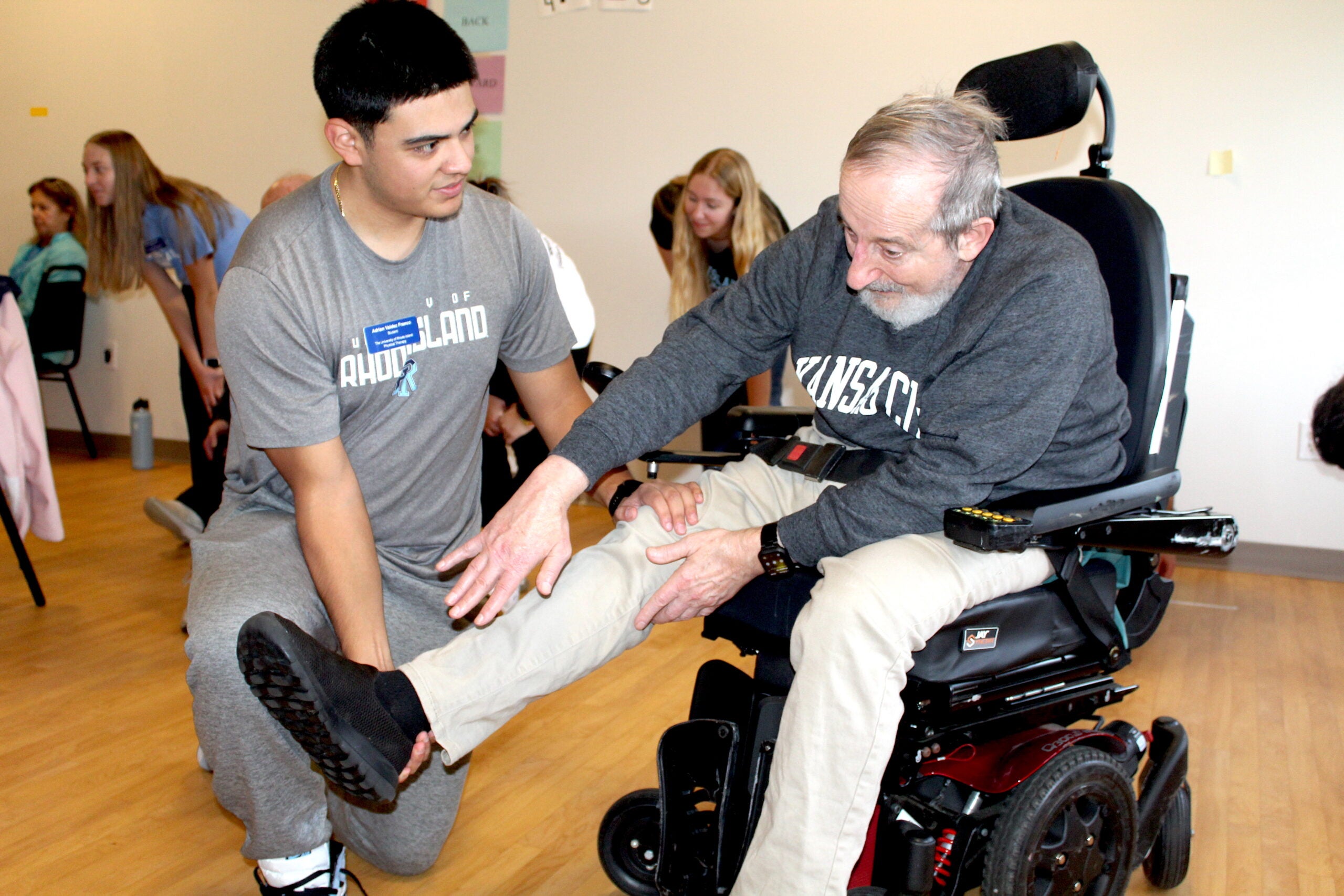KINGSTON, R.I., Nov. 30, 2023 — The exercise room at Independence Square on the University of Rhode Island’s Kingston campus buzzed with chatter about Thanksgiving plans, enlivened with the usual small talk and laughter.
The lightness of the session might have fooled some into thinking that this was just an ordinary exercise class, not part of a battle against a debilitating, incurable disease.
But URI doctor of physical therapy students Brianna Patton of Richmond, Rhode Island; Becca Shorr of Grafton, Massachusetts; and Lindsey Swider of West Warwick, would not have it any other way with the Parkinson’s Exercise Group. The three have been leading PEG, as it is called by the participants and students, since the spring semester. The program has been operating since 2012.
The atmosphere on evaluation day illustrated the strong bond between participants and the three second-year physical therapy students who run each meeting and spend their lunchtime with people living with Parkinson’s. They lead exercises to help the participants move better and deal with their disease.
“I know I’m not going to be cured,” says Mimi White, 68, who has been attending PEG for the past two to three years, “but it’s one hour of fun, jokes, and not taking it seriously.”
White is deeply connected to the South County community, having worked at South County Hospital for 28 years, and later at URI’s Health Services. Additionally, her son and husband graduated from the University.
White inevitably decided to leave her job at Health Services, where she had worked for seven years before her Parkinson’s diagnosis.
“The kids are wonderful,” says White of the graduate students she has spent so much time with. “They include everyone in everything, and they make you want to come back next week. It keeps you going.”
During the recent session, Patton, Shorr and Swider, passed out exercise aides, including colorful hollow rods referred to as “boom whackers,” sparkly ribbons to direct arm movements, and circular neon mats that help to mark foot placement during the activities.
The exercises in the guided class work to improve balance, strength, flexibility, and cardiovascular health while supporting cognitive functions that tend to diminish as Parkinson’s progresses.
During evaluation days, which occur at the beginning and end of each semester, group members take a multi-level balance test that is used to gauge their fall risk.
The exercises are incremental and continuous, but repetition of these movements is what strengthens participants’ ability to keep and recover their balance, and allows them to minimize the amount of time it takes for them to get back up on their feet, says Julia Johnson, a a first-year doctor physical therapy student volunteer, formerly of Portales, New Mexico.
Patton explains how Parkinson’s attacks the cognitive connection between action and thought, making multitasking increasingly difficult. Oftentimes, individuals with Parkinson’s “need to focus on one thing at a time,” because they have lost “the automaticity of movement,” says Patton.
Many of the participants who attend PEG meetings are URI alumni, leading to a strengthened bond between instructors and participants.
Shorr describes the rewarding experience of holding each meeting and forming a connection with participants. “Not only are we helping them physically,” she says, “but we’re a big social piece in their life, and I don’t think you realize that until you enter a leadership position within the group.”
Membership to URI PEG is free of charge, and people living with Parkinson’s at any stage of the disease are invited to attend. The recruitment of new members is another responsibility of the students involved with PEG.
In addition to posting on local Facebook groups and online forums for the Parkinson’s community, the graduate students also posted flyers around campus, at local senior centers, and nearby physical therapy clinics as a part of their capstone course.
In 2021, Assistant Professor of Physical Therapy Christine Clarkin and Associate Clinical Professor Anne Marie Dupre, who are the primary organizers of the program, and have conducted prior research on neurodegenerative diseases, were named the recipients of a $10,000 grant from the Parkinson’s Foundation to support the development of PEG.
Clarkin also received a grant from Brown University as part of the Advance-CTR supported by the IDeA-CTR grant to organize and assess the need for and feasibility of an interdisciplinary clinic for people with Parkinson’s, which was held in spring of 2023.
Many PEG recruits were connected to the program through their prior interactions with Clarkin, having been treated at the clinic, and contributing as research subjects to her earlier studies on the disease. Attendance varies each week, but there are around 30 recipients on the email list who have attended in the past, says Patton
Specific exercises are emphasized according to each participant’s individual goals and obstacles, many of which focus on the core of the body so that in the event of a fall they will ideally be able to get themselves back up off of the ground (or find a way to summon help if they are injured).
“If they do end up on the floor,” says Swider, “they at least have the education from us to get back up safely. Promoting independence is huge for us.”
If you or someone you know is living with Parkinson’s and is interested in learning more about the services provided, attending a session, or accessing more resources, contact Clarkin at chrisclarkin@uri.edu)
Sessions are held every Friday in the Physical Therapy Department at 25 Independence Way on campus from noon to 1 p.m.
###
This story was written by Samantha Melia, a senior journalism and political science major at the University of Rhode Island and an intern in the Department of Marketing and Communications

